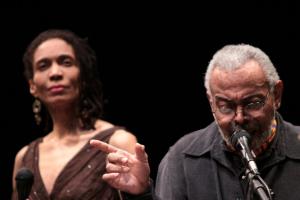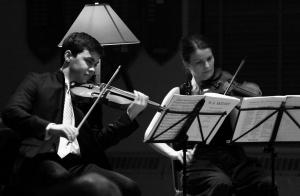Black History Month events accentuate the positive
 If you had an interest in pop music during the 1960s civil rights movement, the Harlem Renaissance or 19th-century African-American farmers in Vermont, Marlboro was the place to be in February. For Black History Month, the college had a wide array of events celebrating the contributions of African-Americans to American culture and society.
If you had an interest in pop music during the 1960s civil rights movement, the Harlem Renaissance or 19th-century African-American farmers in Vermont, Marlboro was the place to be in February. For Black History Month, the college had a wide array of events celebrating the contributions of African-Americans to American culture and society.
Vermont historian Elise Guyette kicked off the program with a discussion of her book Discovering Black Vermont: African-American Farmers in Hinesburgh, Vermont, 1790–1890. The book, which won the 2010 Award of Excellence from the Vermont Historical Society, tells the story of a small black community in northern Vermont that was apparently accorded fair treatment and respect from its white neighbors during a period of U.S. history that spans legalized slavery and Jim Crow laws. Guyette’s lecture took the audience through her process of discovering court documents, town records, newspaper articles and other primary sources to construct what the Valley News calls “a quintessential Vermont pioneering story.”
Later in the month, legendary jazz bassist William Parker brought an octet to the Whittemore Theater to perform music from his 2010 release, I Plan to Stay a Believer: The Inside Songs of Curtis Mayfield. Parker’s group included poet, playwright and activist Amiri Baraka, who founded the Black Arts Movement in Harlem during the 1960s and authored the Obie-winning play Dutchman. Parker and other band members also met with students and faculty to discuss the intersection between art and social consciousness during that era among African-Americans in general, and Curtis Mayfield in particular.
“If you had ears to hear, you knew that Curtis was a man with a positive message—a message that was going to help you to survive,” Parker said. His band performed jazz renditions of Mayfield’s songs, such as “People Get Ready,” “Move on Up” and “Keep on Pushing,” which became anthems of black power and black pride in the 1960s and ’70s.
The final event was a lecture and reading by author and University of Vermont Professor Emily Bernard, entitled “Carl Van Vechten and the Harlem Renaissance.” Bernard discussed the power and potential of interracial friendships through the historical lens of Van Vechten’s role as patron during this early 20th-century period.
“There was really no one like Van Vechten,” said Bernard, whose book Carl Van Vechten: A Life in Black and White will be published by Yale University press later this year. “He did everything he could to promote black artists, he wrote articles and he had parties. He was a genius at throwing parties.” She described how the relationships formed in his apartment, at a time when clubs and other social venues were highly segregated, set the stage for the patronage of many influential artists, from Langston Hughes to Zora Neale Hurston.
Videos of full lectures are available at our website.
 In April, a year of concerts in honor of retiring music professor Luis Battle culminated in a final concert featuring musicians from Marlboro Music. A touring quintet consisting of Benjamin Beilman (violin, pictured left), Veronika Eberle (violin, pictured right), Beth Guterman (viola), Yura Lee (viola) and Judith Serkin (cello) performed a program of Mozart, Haydn and Dvorak.
In April, a year of concerts in honor of retiring music professor Luis Battle culminated in a final concert featuring musicians from Marlboro Music. A touring quintet consisting of Benjamin Beilman (violin, pictured left), Veronika Eberle (violin, pictured right), Beth Guterman (viola), Yura Lee (viola) and Judith Serkin (cello) performed a program of Mozart, Haydn and Dvorak.
